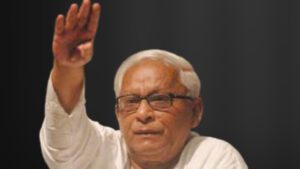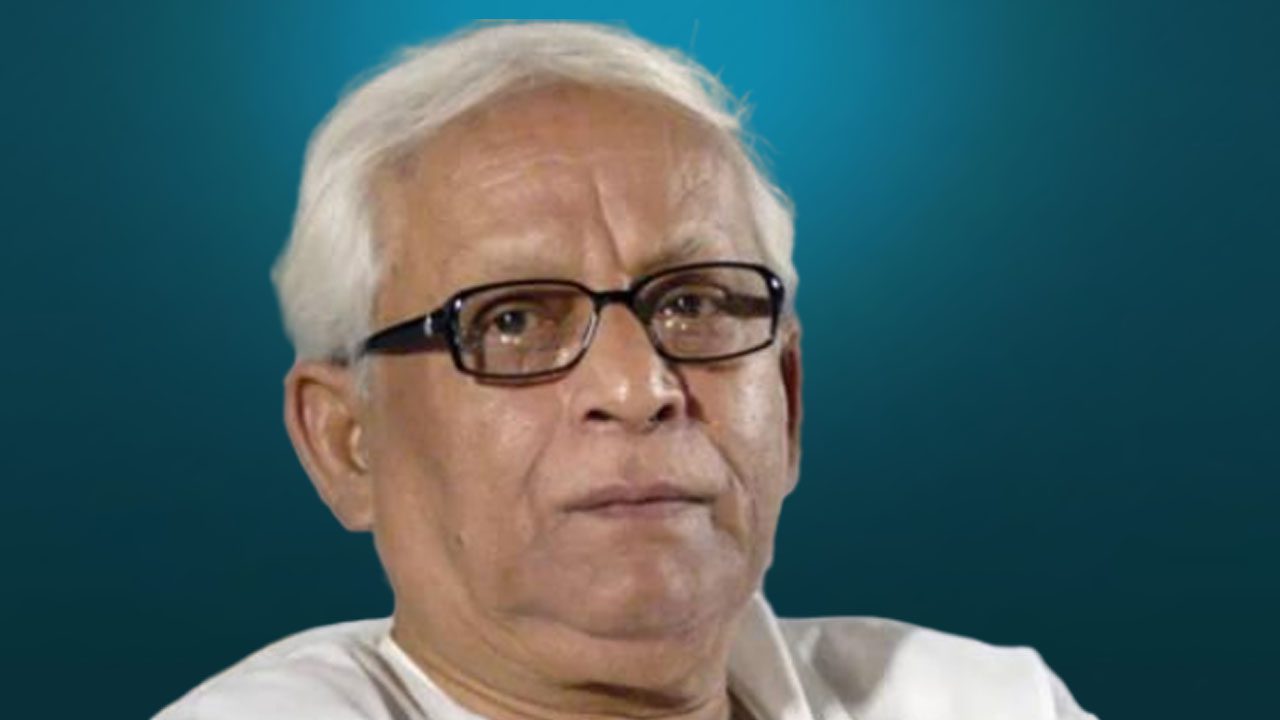The political and cultural environment of West Bengal is closely associated with the name Buddhadeb Bhattacharjee, who has had a profound impact on the state’s history. During his time as West Bengal’s previous chief minister, Bhattacharjee oversaw important socioeconomic changes, a rebirth of culture, and the adoption of political beliefs that still shape the state’s future. This article explores Buddhadeb Bhattacharjee’s life, career, and legacy, emphasizing his contributions to West Bengal and his enduring influence on Indian politics.

buddhadeb bhattacharjee Early Years and Upbringing
Contents
On March 1, 1944, Buddhadeb Bhattacharjee was born in the thriving metropolis of Kolkata, which was then known as Calcutta. Being up in a politically engaged household, Bhattacharjee was early exposed to leftist ideas. Sukumar Bhattacharjee, his father, was a well-known author and ardent communist supporter. Early exposure to Marxist ideas prepared Bhattacharjee for his subsequent political career.
Bengali literature was the subject of Bhattacharjee’s studies at Kolkata’s esteemed Presidency College. His training in literature and the arts not only influenced his intellectual interests but also proved vital in his political career, as he frequently highlighted the value of education and culture in the advancement of society.
The Ascent to Power
When Buddhadeb Bhattacharjee joined the Communist Party of India (Marxist) [CPI(M)] in the 1960s, his political career officially began. His membership in the party came at a time when West Bengal was experiencing intense political unrest brought on by the emergence of Marxist movements and the Naxalite insurgency. Bhattacharjee advanced in the CPI(M) ranks swiftly, winning praise for his devotion, eloquence, and ideological clarity.
When the CPI(M)-led Left Front took power in West Bengal in 1977, Buddhadeb Bhattacharjee was named Minister of Information and Cultural Affairs in the Jyoti Basu administration. As a result of his ability to organize programs to advance Bengali culture and the arts, he became well-known as a cultural leader in the state.
West Bengal’s chief minister
With the election of Buddhadeb Bhattacharjee as West Bengal’s Chief Minister in 2000, the state’s political landscape entered a new phase. Jyoti Basu had been the previous Chief Minister. During his time as Chief Minister, he made an effort to modernize the state’s economy while preserving its cultural legacy, an endeavor that is frequently recalled.
Industrialization and Economic Reforms
Pushing for industrialization and economic changes was one of Buddhadeb Bhattacharjee’s most important contributions during his term. West Bengal had been trailing other states in industrial development, thus Bhattacharjee tried to draw investment to the state after realizing the necessity for economic expansion and the creation of jobs. His administration started enacting laws to encourage industrial development, especially in the manufacturing and IT industries.
Among the main achievements of his term were the construction of the IT hub in Salt Lake, Kolkata, and the initiatives taken to draw significant industrial projects, including the Tata Nano plant in Singur. Even while the goal of these programs was to provide employment and strengthen the state’s economy, they also caused controversy and criticism, especially from activists and farmers who had reservations about land acquisition.
Renaissance of Culture
During Buddhadeb Bhattacharjee’s stint as Chief Minister, West Bengal saw a cultural rebirth. Bhattacharjee was a fervent supporter of the arts and thought that culture was essential to the advancement of civilization. He backed a number of cultural endeavors, such as the advancement of Bengali theater, film, and literature. Under his direction, Kolkata remained a thriving center of culture.
The artistic world admired Bhattacharjee for his efforts to promote Bengali culture, and he was frequently regarded as a patron of the arts. His passion for movies and his training in Bengali literature were evident in the policies he developed to protect and advance West Bengal’s rich cultural legacy.
Difficulties and Debates
Although there were many accomplishments during Buddhadeb Bhattacharjee’s time as chief minister, there were also difficulties and disagreements. He encountered a great deal of difficulties, chief among them being opposition to the acquisition of land for industrial enterprises. Major turning points in his political career were the Singur and Nandigram episodes, where the government encountered strong opposition from local communities and farmers.
Specifically, the Singur dispute came to represent the struggle between industrialization and agricultural rights. Widespread protests against the Tata Nano plant’s decision to purchase land eventually forced the project’s cancellation. This episode brought to light the difficulties in striking a balance between local communities’ rights and means of subsistence and economic development.
Election Loss and Legacy
After more than ten years in office as Chief Minister, Buddhadeb Bhattacharjee’s administration suffered a severe electoral setback in 2011 at the hands of Mamata Banerjee’s Trinamool Congress (TMC). After 34 years of Left Front hegemony, known as the “Red Era” in West Bengali history, came to an end with the defeat.
Bhattacharjee’s reputation as a leader who tried to modernize West Bengal while maintaining its cultural character is important even after the election defeat. During his term, he is largely noted for his dedication to socialist principles, his efforts to advance Bengali culture, and his attempts to enact economic changes.
The Influence of Buddhadeb Bhattacharjee on Indian Politics
Buddhadeb Bhattacharjee’s impact was felt across the country, not just in West Bengal. He was a major contributor to the national development of the CPI(M)’s programs and tactics as a senior leader. He was well-liked by the larger Indian left for his practical approach to government and his flexibility in responding to shifting conditions.
Bhattacharjee was well-known for his scholarly approach to politics and for frequently participating in conversations about philosophy, literature, and culture. He stood out from many of his peers because of his intellectualism, which also helped to shape his reputation as a leader who valued education and information.
Life After Retirement
Buddhadeb Bhattacharjee withdrew from public life when he resigned from active politics to concentrate on his personal and health. He is still regarded as a prominent person in West Bengal despite his hiatus from active politics, and the CPI(M) leadership frequently consults with him on important matters.
Both Bhattacharjee’s admirers and detractors still recognize his contributions to the political and cultural environment of West Bengal. His life and work provide as a monument to the difficulties of governing in a society where social fairness and cultural preservation must coexist with the goal of economic progress.
In summary
The political and cultural legacies of Buddhadeb Bhattacharjee are inextricably linked to West Bengal’s past. His initiatives to support communist principles, advance Bengali culture, and modernize the state’s economy have had a long-lasting effect on the growth of the region. Despite the ups and downs that accompanied his stint as Chief Minister, his dedication to the well-being of the populace and his love of the arts have cemented his place in West Bengal’s history. Buddhadeb Bhattacharjee’s contributions will always be an importa
